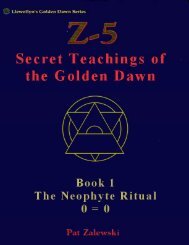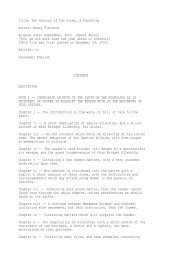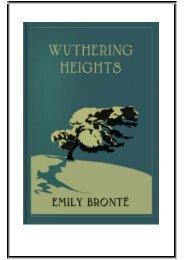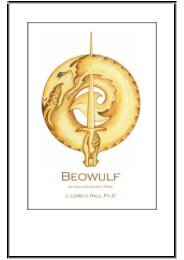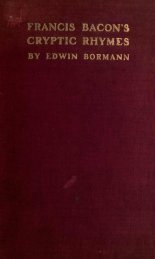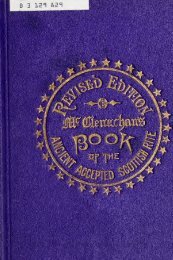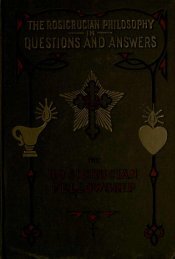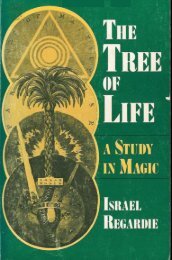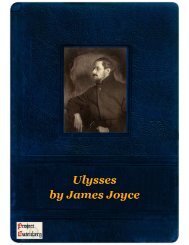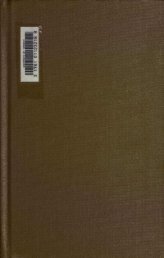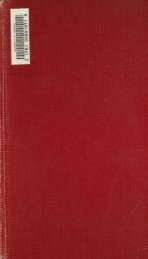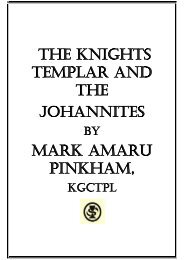Click to download PDF version: 3.87MB - Global Grey
Click to download PDF version: 3.87MB - Global Grey
Click to download PDF version: 3.87MB - Global Grey
Create successful ePaper yourself
Turn your PDF publications into a flip-book with our unique Google optimized e-Paper software.
205 At the Back of the Black Man's Mind By R. E. Dennett<br />
have brought his Igbadu in<strong>to</strong> it previously under cover of night <strong>to</strong> preserve the sacred<br />
object from public gaze, and there perform his ceremony with the aid of such fellow<br />
Olodu priests as he might have seen fit <strong>to</strong> invite.<br />
Ifa lays claim <strong>to</strong> every plant in creation as sacred <strong>to</strong> his worship, and thus it is come <strong>to</strong><br />
pass that upon consultation by a Babalawo, one Odu will advise the use of the leaves of<br />
certain plants; another will prescribe one of these, or others <strong>to</strong>tally different along with<br />
them, and so other Odus. But the plants whose leaves are always in demand, and which<br />
are considered as specially sacred <strong>to</strong> Eji Ogu, the Prince of all Odus, are Tete, Odundun,<br />
Renren, Gbegi, the Oriji herb, lpoye, omini, and the Iwerejeje plant; but some of these<br />
are known and described by sacred names on occasions of, or for purposes of<br />
divination. Then the leaves of the Tete herb become Ewe attedaiye, i.e., the herb that<br />
be<strong>to</strong>kens our seniority in our entrance in<strong>to</strong> the world; Renren becomes Ewe tutu, the<br />
herb of pacification; and Gbegi become Ewe Agidimogboyin.<br />
Ifa or Orunmila is believed <strong>to</strong> know all and everything and is therefore consulted upon<br />
every circumstance of life, that of sickness not excluded; and he, through a consulting<br />
Babalawo, always prescribes medicines for the diseases referred <strong>to</strong> him; and for this,<br />
there is a foundation in the circumstance that in the traditional sayings of every Olodu,<br />
or Odu, mention is always <strong>to</strong> be found made of sufferers from this or that form of<br />
disease and of the remedies that cured them effectually. Hence every Babalawo is<br />
necessarily a physician in his own way, and he is often resorted <strong>to</strong> by professional<br />
practitioners for consultation with Ifa for aid <strong>to</strong> them in the exercise of their art.<br />
Ela is evidently one of the many attributive names by which Ifa is described, and a very<br />
principal one among them. It is a contraction of the term "Orun mila," and is intended <strong>to</strong><br />
represent the Divinity <strong>to</strong> all its worshippers and devotees, principally as a Saviour and<br />
Deliverer, and one that is strong and mighty and is unconquerable by Death itself, so<br />
that all that look <strong>to</strong> him for help in trouble and against any other evil, death not<br />
excluded, will find that their confidence has not been misplaced; and this, although the<br />
name is often used as if it represented a separate and distinct Divine personality, and<br />
although a separate and distinct representative ensign made of pieces of ivory, carrying<br />
four eyelets each and corresponding in number <strong>to</strong> the Ifa palm nuts (Ikin) which, with<br />
one Oduso, are 17, are chosen and employed <strong>to</strong> represent him.<br />
He is sometimes described in songs of praises and in other speeches as "Ela omo Osin"<br />
Ela the child of "Osin" (the Ruler); sometimes as "Ela omo Oyigi (Oyigiyigi) Ota omi"<br />
Elathe offspring of a s<strong>to</strong>ne, i.e., the hard s<strong>to</strong>ne from the bed of a spring of water (an<br />
emblem of great strength), a quality which believed in, enables devotees <strong>to</strong> identify<br />
themselves with him, and regard themselves free in consequence from death, or<br />
protected against it, and say also when they utter the above praise, "Awa di Oyigiyigi, a<br />
ki o ku mo," "We are ourselves. becomeOyigiyigi, that is the s<strong>to</strong>ne which gave birth <strong>to</strong><br />
Ela, and will no longer die," or, at other times <strong>to</strong> say, "Ela ro a ki o ku mo-Okribiti, Ela ro<br />
(sokale) Oruo Ifa," "Ela has descended <strong>to</strong> the earth-we shall die no more-and this is Ifa's<br />
www.globalgrey.co.uk



